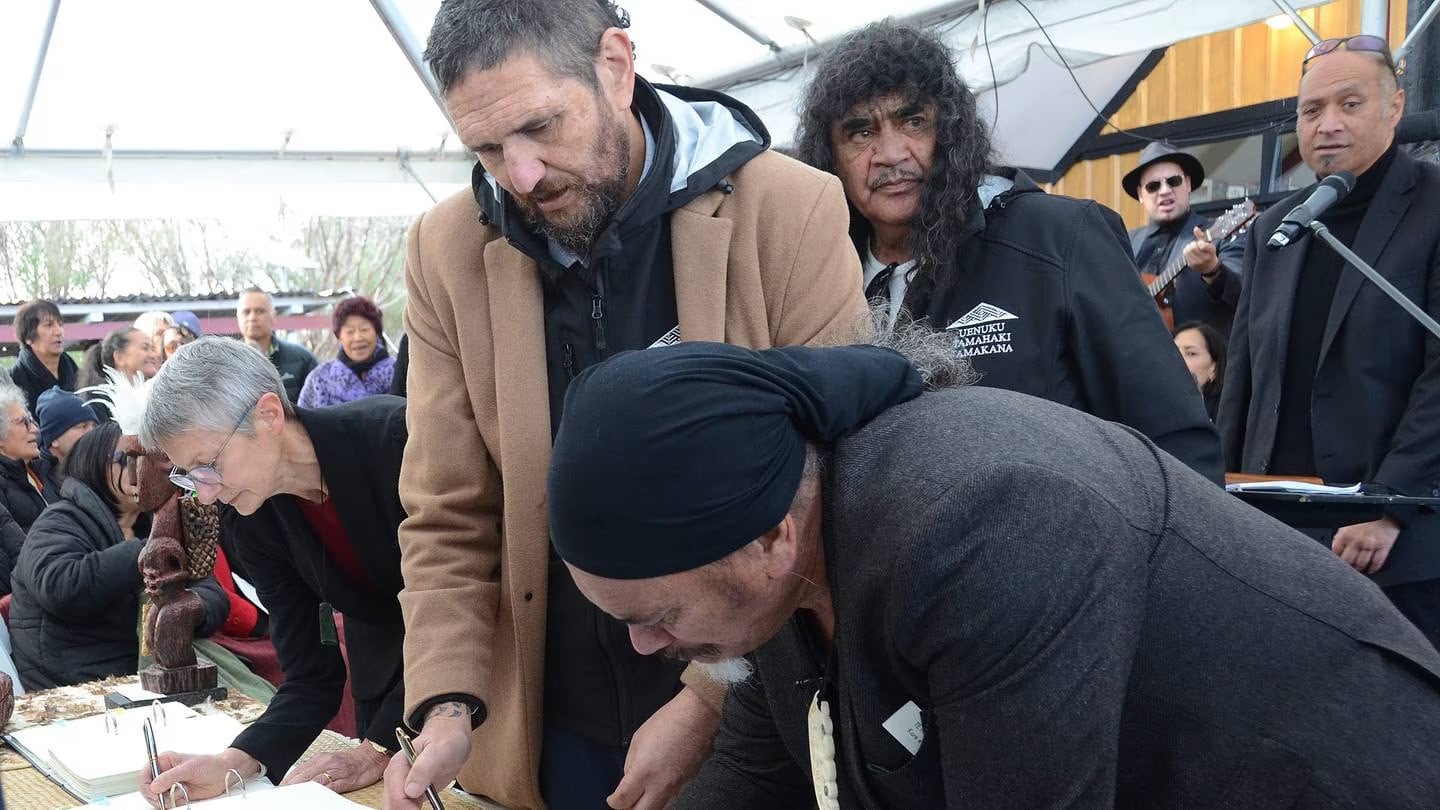A Tamahaki kaumātua and negotiator for Te Korowai o Wainuiārua iwi collective says the Treaty of Waitangi settlement signed at Raetihi on Saturday is the result of the efforts of many over decades.
After 10 years in the negotiation process, Uenuku, Tamahaki and Tamakana signed Te Tihi o te Rae, which will deliver $30 million in redress to the mountain and river tribes. They also received an apology from Treaty Negotiations Minister Andrew Little, on behalf of the Crown.
Paora (Baldy) Haitana said those who were no longer there to witness the signing or hear the apology were in everyone’s thoughts on Saturday, in particular trustee and iwi historian Robert (Boy) Cribb.
“He was an icon of our settlement, he was an icon of Uenuku, Tamahaki, Tamakana. He was one of our historians and researchers who was in the archives learning about how these things happened. It was only five or six weeks ago that he passed, and we remember him today with affection and love.
“But there are many, many before Boy - for example, Larry Ponga, Paiki Johnson, Te Tahuera Haitana, Marie Ponga, Marina Williams, Niko Tangaroa, Te Moananui Ponga, Mark Koro Cribb - the father of Boy Cribb - and Mark’s son-in-law Punui Whitu, who was one of our apōtoro up at Tieke who carried the mantle of Tahupōtiki Wiremu Rātana.
Biggest challenge: the Crown
“Many, many have passed and many, many are fondly remembered. This is a day for them.”
Uenuku chair and iwi negotiator Aiden Gilbert said the biggest challenge of the negotiations was dealing with the Crown.
“I think 10 years signifies how much of a challenge it was. Three successive governments and always when there’s a new government, there are changes.”
Asked if the redress was adequate compensation for what was lost, Gilbert said no iwi would say it was enough.
“What is enough? It’s never going to be enough if we measure things. If we do calculations and equate things, these are just crumbs off the table. But the healing has to start... as long as the Crown doesn’t continue to do wrong. In the 10 years of doing negotiations, they were still tripping over themselves and continuing to do what they did to us historically as a people. Therein lies the challenge.”
Gilbert said the settlement means “we can say who we are and speak for ourselves”.
1.6 million acres lost
“People forget, Te Korowai o Wainuiārua is 1.6 million acres [647,500ha], which is no small rohe, and overlapped by every iwi around us. We’re this iwi that’s been trying to push back for years, decades, one could even say a hundred years but, finally it’s a chance for us to stand up and tell our story.”
Gilbert’s advice to those who were still negotiating a settlement was to keep talking.
“You’re going to have to talk anyway. Lean on your people, lean on your grievances but don’t hang on to them, because this is the opportunity to move ahead. Have a good team, people who are passionate, people who are there for the kaupapa.”
Te Korowai o Wainuiārua lead negotiator Chris McKenzie said there was now forever on record a historical account of the interactions between the people of the area and the Crown.
“And from that historical account follows Crown acknowledgements of wrongdoings and injustices, leading to an apology. But mostly, people will recall the return of lands in this settlement. There is return of lands from every corner of the rohe.
“Of course, not all lands can be returned. Many of them are in private ownership. As a result, we will be able to access both a cultural and a commercial fund which is approximately $30 million.
A chance to re-energise
“But there are also extensive agreements to enable the people to have a place back in their society. There are multiple relationship agreements with the Crown. There are a range of mechanisms which allow us to be active once again in the use of our lands in this area.
“And then there are a range of nicer things to have in settlement packages - the renaming of appropriate place names reverting back to their original names, the rights for us to gather and harvest traditional taonga, minerals - a whole range of... mechanisms to allow us to have our identity back in this area.”
McKenzie said the settlement process was divisive.
“We have to draw lines on maps and have discussions with our neighbours over our respective areas of interest. All of these have been huge hurdles to get through but we’re really, really pleased to have got through them.
“This rohe is one of the last to have their settlements done. This piece of justice coming to the wider rohe will re-energise and boost all the peoples in this area collectively, and I think it will enable the development of their own identities in their own places.”
McKenzie said much of the negotiation was spent working through difficult mechanisms with Crown agencies to ensure that the mana of the whenua is respected moving forward “and that our voice is heard in that process”.
“There are multiple mechanisms within our settlement package to address, ensuring our traditions, our sacred taonga and our whenua continue to be cared for and nurtured.”


